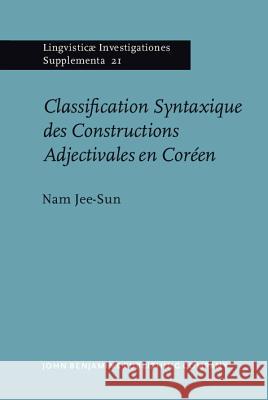Classification Syntaxique DES Constructions Adjectivales En Coreen » książka
Classification Syntaxique DES Constructions Adjectivales En Coreen
ISBN-13: 9789027231307 / Angielski
The purpose of this study is the systematic description of a set of data called Adjectives in Korean, which reduces to a minimum theoretical preoccupations and abstract formalisations with no practical applications. The framework of our research is the Lexicon-grammar, whose fundamental idea is that the minimal meaningful unit is the simple sentence and not an isolated word. This work is constituted as follows: given that the corpus extracted from current dictionaries is insufficient for our purpose, we will reconstitute a complete corpus: first, with a formal definition, and then according to some other principles discussed in the first section. With this more complete corpus (5300 items), we will examine in the second section general syntactic properties of adjectival constructions. The third section is devoted to the description of 15 classes of adjectival structures. These syntactic classes will be represented in the form of tables in the annex. The results obtained in this work are indispensable at least for the following activities: first, the elaboration or verification of a linguistic theory demands a priori examination and systematic description of empirical data; furthermore, a syntactic description of lexical data, which is as exhaustive as possible, has a particular interest in the perspective of the elaboration of a lexicon suitable for computer processing of natural language.L'objectif de cette etude est la description systematique d'un ensemble de donnees dit Adjectifs en coreen, en reduisant au minimum les preoccupations theoriques et les formalisations abstraites et eloignees des faits. Notre demarche s'inscrit dans le cadre du Lexique-grammaire, dont l'idee fondamentale est que l'unite minimale de sens est la phrase simple et non le mot isole. Ce travail est constitue de la maniere suivante: etant donne que le corpus extrait des dictionnaires actuels est insuffisant pour notre objectif, on reconstituera un corpus complet: d'abord avec une definition formelle, et ensuite selon certains autres principes dont nous parlerons dans la premiere partie; une fois ce corpus constitue (5300 items), on examinera dans la deuxieme partie, les proprietes syntaxiques generales des constructions adjectivales; la troisieme partie est consacree a decrire 15 classes de structures adjectivales. Ces classes syntaxiques se presentent sous la forme des tables dans l'annexe. Les resultats que nous avons obtenus dans ce travail sont indispensables au moins pour les deux activites suivantes: d'abord, une elaboration ou une verification d'une theorie linguistique exige prealablement l'examen et la description systematique de donnees empiriques; par ailleurs, une description syntaxique des donnees lexicales, aussi exhaustive que possible, a un interet particulier dans la perspective de l'elaboration d'un lexique adequat au traitement informatique du langage naturel.











